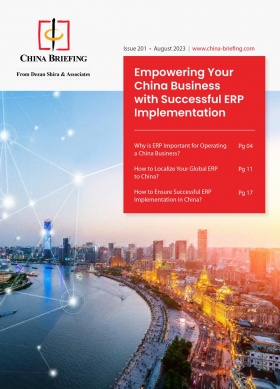China Monthly Tax Brief: September 2023
In our China Monthly Tax Brief for September 2023, we discuss the 16 tax policies implemented or extended by the Ministry of Finance (MOF), State Taxation Administration (STA), and other departments. In addition, China also rolled out several new policy measures to improve the business environment for foreign businesses, including measures to encourage foreign investment, facilitate cross-border data transfer, and cross-border capital transfers.
In September 2023, China’s tax and financial authorities released 16 preferential tax policies to alleviate the tax burden on various sectors of society and industry. These include policies to improve social welfare as well as policies benefiting various industries, such as the agricultural sector and rural areas, culture and education sectors, and the energy sector, among others.
September also saw the release of several new policy documents, both in draft and final form, that aim to improve the business environment for foreign-invested enterprises and attract more foreign investment. Among them are proposals to drastically facilitate the export of data outside of China, and a program to enable free cross-border capital transfers for foreign companies operating in Beijing and the Shanghai Free Trade Zone (FTZ).
Extensions and implementation of 16 tax policies
The 16 tax policies include extensions of existing policies, such as various individual income tax (IIT) policies that were extended until the end of 2027, as well as brand new ones.
The preferential tax policies are summarized in the table below.
| Policy | Sector | Details | |
| 1 | Extension of value-added tax exemption for domestic anti-HIV drugs | Welfare |
The policy is in place until December 31, 2027. |
| 2 | Extension of relevant tax policies for heating enterprises | Welfare |
This policy is extended until the end of the heating period in 2027 (typically until March 15 of each year but subject to change). |
| 3 | Exemption of corporate income tax for enterprises that produce and assemble special supplies for disabled people | Welfare |
The policy is in place until December 31, 2027. |
| 4 | Extension of the implementation of preferential tax policies for certain national commodity reserves | Welfare |
The policy is extended until December 31, 2027. |
| 5 | Extension of the Implementation of Certain Administrative Charges and Government Fund Preferential Policies | Welfare |
The policy is extended until December 31, 2027. |
| 6 | Extension of reduction of vehicle purchase tax on vehicles
|
Welfare |
The policy is extended until December 31, 2027. |
| 7 | Extension of the implementation of preferential tax policies for small loan companies | Agriculture and rural |
The policy is extended until December 31, 2027. |
| 8 | Extension of the implementation of preferential policies on property tax and urban land use tax for agricultural product wholesale markets and farmers’ markets | Agriculture and rural |
The policy is extended until December 31, 2027. |
| 9 | Extension of the VAT policy for border sales of tea | Agriculture and rural |
The policy is extended until December 31, 2027. |
| 10 | Extensions of the implementation of preferential tax policies for safe rural drinking water projects | Agriculture and rural |
The above-mentioned operation and management units can enjoy the “three exemptions and three half reductions” CIT treatment, that is:
The policy is extended until December 31, 2027. |
| 11 | Extension of the CIT policy to support rural financial development | Agriculture and rural |
The policy is extended until December 31, 2027. |
| 12 | Extension of the VAT policy to support the development of cultural enterprises | Culture and education |
The policy is extended until December 31, 2027. |
| 13 | Extension of the preferential VAT policy for publicity and culture | Culture and education |
The policy is extended until December 31, 2027. |
| 14 | Extension of the implementation of real estate tax and stamp duty policies for university student apartments | Culture and education |
The policy is extended until December 31, 2027. |
| 15 | Extension of the preferential resource tax reduction policy for shale gas | Energy |
The policy is extended until December 31, 2027. |
| 16 | Extension of the VAT policy for second-hand car sales | Consumer |
The policy is extended until December 31, 2027. |
Observations from Dezan Shira & Associates
The goals of this series of preferential tax policies are multi-faceted. They aim to reduce the tax burden of business units in the target fields and industries and promote their healthy development, improve people’s livelihoods and well-being, promote agricultural and rural development, and promote the recovery of green energy and cultural industries.
We have taken note that these tax preferential policies mainly target the reduction of VAT and CIT on specific income of eligible companies, as well as the exemption of property taxes (property tax, deed tax, land use tax) on real estate and land held by these companies.
According to data released by the MOF, eliminating the impact of companies’ applications for VAT refunds in 2022, tax revenue between January and August this year increased by only 0.7 percent year-on-year. Meanwhile, non-tax revenue has fallen for five consecutive months.
However, the growth rate of expenditure on people’s livelihoods is relatively high, which reflects the government’s focus on social welfare, education, and agricultural and rural development. The continuation of these tax incentives is a positive signal, aiming to create more opportunities in the current economic environment and is expected to provide financial support to companies in related fields, while helping to achieve the government’s social and economic development goals.
Increasing R&D expense deduction rate
In order to encourage R&D and innovation in the integrated circuit (IC) and industrial machinery domains, the MOF, STA, and other departments announced an increase to the R&D expense super-deduction ratio for companies in these sectors.
Specifically, if the R&D expenses actually incurred by IC or industrial machinery companies have not formed intangible assets and are included in the current profits and losses, then 120 percent of the actual amount can be deducted before tax during the period from January 1, 2023 to December 31, 2027.
If intangible assets are formed, they can be amortized before tax at 220 percent of the cost of the intangible assets during this time period.
Companies that wish to enjoy this tax policy must verify their eligibility with the National Development and Reform Commission (NDRC) and the Ministry of Industry and Information Technology (MIIT).
The super deduction of R&D expense is also available for general companies, with the following rates currently in place:
- For R&D activities that do not form intangible assets and are included in the profits and losses of the current period, an additional 100 percent of the actual amount can be deducted before tax;
- For expenses incurred by a company entrusting domestic and external institutions or individuals to conduct R&D activities, they can be included in the entrusting party’s R&D expenses and deducted at 80 percent of the actual amount incurred;
- For expenses incurred by a company entrusting an overseas institution to conduct R&D activities, 80 percent of the actual amount incurred will be included in the R&D expenses of the entrusting party for super deduction. However, the portion of the entrusted overseas R&D expenses that exceeds two-thirds of the domestic eligible R&D expenses cannot be included in the super deduction calculation.
See also our article covering eligibility case studies for the R&D super deduction.
In addition to the super deduction policy, in order to encourage the development of scientific R&D, the MOF, Ministry of Commerce (MOFCOM), and the STA introduced several preferential tax policies in September. These policies will be implemented until December 31, 2027.
| Policy | Eligible companies | Details |
| Additional VAT deduction policy for advanced manufacturing enterprises | General taxpayer companies in high-tech industries |
|
| CIT policies for deduction of equipment and appliances
|
All businesses |
|
| VAT policy for equipment purchased by R&D institutions | Qualified domestic R&D institutions and foreign R&D centers |
|
| Extension of tax policies for technology business incubators, university science parks and maker spaces | Technology business incubators, university technology parks, maker spaces |
|
New improvements to the business environment for FIEs
Policies to encourage foreign investment
China has been rolling out more and more documents to promote the concrete implementation of policies to attract foreign investment.
After the State Council issued the Opinions on Further Optimizing the Foreign Investment Environment and Increasing Attraction of Foreign Investment (the “Opinions”) on August 13, foreign-invested enterprises (FIEs) in China have been very concerned with how the 24 measures outlined in these opinions will be implemented, and especially the measures related to government procurement, security, and cross-border investment.
Meanwhile, the two documents also call for encouraging foreign investors to establish foreign-funded R&D centers and jointly carry out technology R&D and industrial applications with domestic companies and undertake major scientific research projects.
Facilitating cross-border capital flows
In September, China took a major step in liberalizing cross-border flows of capital in Beijing and Shanghai.
The two cities simultaneously announced plans to support unrestricted fund transfers related to legitimate foreign investments, thus streamlining the inflow and outflow of capital for FIEs operating in certain areas.This is a significant relaxation of restrictions on foreign capital and is a major reform under the capital account.
In Shanghai, the implementation plan has already been passed and came into effect retroactively from September 1, 2023. The new policy will apply to the Shanghai Pilot FTZ and the Lingang New Area, both of which are situated in Shanghai’s eastern Pudong District.
Meanwhile, Beijing is soliciting feedback from the public on its plan until October 19, 2023. The policy would be implemented city-wide.
Facilitating reinvestment
The draft Beijing FI Regulations also seek to encourage foreign-invested enterprises to reinvest within the country. To this end, they propose exploring the implementation of exempting FIEs from foreign exchange registration for reinvestment, which is a requirement for FIEs in China.
They also call for municipal departments governing development and reform, commerce, economy and information technology, and science and technology to provide FIEs with the same support policies and resource guarantees for profit reinvestment and new foreign investment.
The China Monthly Tax Brief is a new series produced in association with the experts at Dezan Shira & Associates’ China practice.
Also read
- China Monthly Tax Brief: August 2023
- China Monthly Tax Brief: July 2023
- China Monthly Tax Brief: June 2023
About Us
China Briefing is written and produced by Dezan Shira & Associates. The practice assists foreign investors into China and has done so since 1992 through offices in Beijing, Tianjin, Dalian, Qingdao, Shanghai, Hangzhou, Ningbo, Suzhou, Guangzhou, Dongguan, Zhongshan, Shenzhen, and Hong Kong. Please contact the firm for assistance in China at china@dezshira.com.
Dezan Shira & Associates has offices in Vietnam, Indonesia, Singapore, United States, Germany, Italy, India, Dubai (UAE), and Russia, in addition to our trade research facilities along the Belt & Road Initiative. We also have partner firms assisting foreign investors in The Philippines, Malaysia, Thailand, Bangladesh.
- Previous Article China’s Golden Week Boosts Consumption, Showing Positive Economic Signs
- Next Article China-Palestine Relations – Bilateral Trade, Investment and Diplomacy























